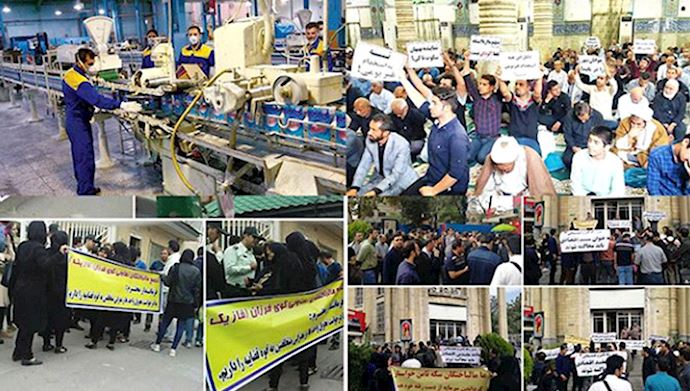
The protests in Iran continues over the high corruption, human rights abuse and the repressive measures the government is taking in response to the legitimate calls for change.
A rising wave of protests has swept across Iran in response to the snowballing crises overtaking the Iranian regime. Reports from MEK’s network inside Iran indicate new protests and strikes arise each day among every sector of Iranian society as the ongoing uprising against the corrupt and incompetent regime reach a fever pitch.
The time has come for the world community to stand by the people of Iran in their uprising against the religious fascist regime ruling #Iran and recognize their determination to achieve regime change and freedom.#ExpelIranDiplomatTerrorists https://t.co/yc8oSrxOtQ pic.twitter.com/IiAjJ5oiRe
— Maryam Rajavi (@Maryam_Rajavi) October 22, 2018
Firefighters Protest
Firefighters in Shadegan gathered outside of the Khuzestan’s governate office to demand an increase in pay. The protesters represented 300 firefighters who have not been paid in nine months.
Protests escalate in #Iran as people seek answers to their demands.#IranProtestshttps://t.co/84epL7srE7
— People's Mojahedin Organization of Iran (PMOI/MEK) (@Mojahedineng) October 22, 2018
Youth Protests
In Behbahan, youth protested again against unemployment at the Friday prayer site. The protesters rallied because authorities are hiring non-locals to work at the nearby refinery while the town’s youth are left without jobs.
October 22
Tehran, #Iran
Amir Kabir University students protest the extremely poor self-service food conditions.#IranProtests pic.twitter.com/INnkCebcda— People's Mojahedin Organization of Iran (PMOI/MEK) (@Mojahedineng) October 22, 2018
Truck Drivers’ Strikes
Iran’s truck drivers finally forced the regime to concede to three of their demands after three weeks of continuous strikes. This is the third strike by Iranian truckers this year. The striking drivers, who have received international support from trade unions, have been subjected to mass arrests and threats of execution by the regime.
Credit Firm Clients’ Protests
Clients of the Caspian credit firm gathered outside of the regime’s Central Bank in Tehran to demand the return of their looted money by the Revolutionary Guards-linked financial institution.
During the rally, the protesters chanted: “The bankrupt government is sitting on our money!”
October 20
Mashhad, northeast #Iran
Clients of the Shandiz credit firm are seen protesting & demanding their stolen savings returned.#IranProtests pic.twitter.com/R7pJyHhZfx— People's Mojahedin Organization of Iran (PMOI/MEK) (@Mojahedineng) October 21, 2018
In the city of Rasht, plundered clients of the Caspian credit union gathered in front of the Caspian branch in a downpour of rain to demand the return of their sacongs.
They chanted:
“Our life’s work has been stolen and plundered!”
“We’ll continue our protests until our money is returned!”
“Our money has been stolen and we can’t put food on the table!”
In Tehran, clients of the Kuye Farzan credit company gathered outside the mayor’s office to protest. They held a banner that read, “We are requesting houses and criminals to be handed over to the judiciary.”
Also in Tehran, clients of the Sekeye Thaman credit company gathered in front of the public prosecutor’s office to demand that their stolen savings be returned to them.
Tehran, #Iran
Vanak district
Seven years after providing the initial payment, these locals are rallying outside the "New Cities Construction Company" demanding their houses.#IranProtests pic.twitter.com/pz8I5HXG3O— People's Mojahedin Organization of Iran (PMOI/MEK) (@Mojahedineng) October 21, 2018
Livestock Workers’ Strikes
On Monday, livestock workers in Haft Tappeh went on strike to protest pressure imposed by regime officials.
Qazvin, northwest #Iran
Work in the Tuli Press factory has come to a standstill.
370 workers have lost their jobs. pic.twitter.com/RU2xosxbFZ— People's Mojahedin Organization of Iran (PMOI/MEK) (@Mojahedineng) October 21, 2018
Municipality Workers’ Protests
On Monday, municipality workers in Shushtar rallied outside of city hall to demand their paychecks that have been delayed for the past six months, due to a privatization measure that the employees did not agree to.
Students’ Protests
On Saturday, a group of Ph.D. students from across Iran rallied in Tehran to protest the lack of foreign currency based on government rates. This policy was promised by education officials and not honored. The rally was held despite threats by education officials.
October 20
Tehran, #Iran
PhD students rallying outside the Ministry of Sciences, protesting authorities' refusal to provide currency to college students based on government rates.#IranProtests pic.twitter.com/rsWjBUTg4m— People's Mojahedin Organization of Iran (PMOI/MEK) (@Mojahedineng) October 20, 2018
On Monday, students at Sanandaj Open University in western Iran protested the decision by officials to eliminate the field of nursing one week into courses.
Factory Workers’ Protest
Factory workers in the Albroz Industrial Complex in Qazvin Province held a rally to protest the withholding of their pensions for the past 14 months.
Teachers’ Strikes
Nationwide strikes by Iran’s teachers have spread to 103 cities, according to the most recent reports, and continued for their second day on Monday.
Sources report that all teachers are on strikes in the cities of Qeshm, Ahvaz, Poldokhtar, Ravansar, Rafsanjan, Zarineh and Babol. The strikes have also spread to Mashhad, Marivan, Isfahan, Hamedan, Karaj, Homayounshahr, Shahinshar, Ahvaz, Baneh, Ravansar, Divandareh, Shiraz, Sanandaj, Sari, Langrud, Saqqez, Khomeini Shahr, Kermanshah, and many other cities.
The nationwide strikes began on Sunday to protest low pay and benefits, inability to form labor unions, failure of the regime to implement agreed-upon policies, and poor learning environments for students.
Teachers have also demanded the release of their imprisoned colleagues.
Students in a number of cities have voiced their support for their striking teachers.
Strikes have become a popular means of protest since the massive anti-regime uprising began in Iran last December. Iranians from every social class and sector of society have joined together in raising their voices against the mullahs’ regime, with thousands taking to the street to protest and many closing their shops and refusing to enter their places of business. The MEK works each day to organize these diverse groups of people in their shared goal of overthrowing the corrupt regime and bringing democracy back to Iran.
Staff Writer
